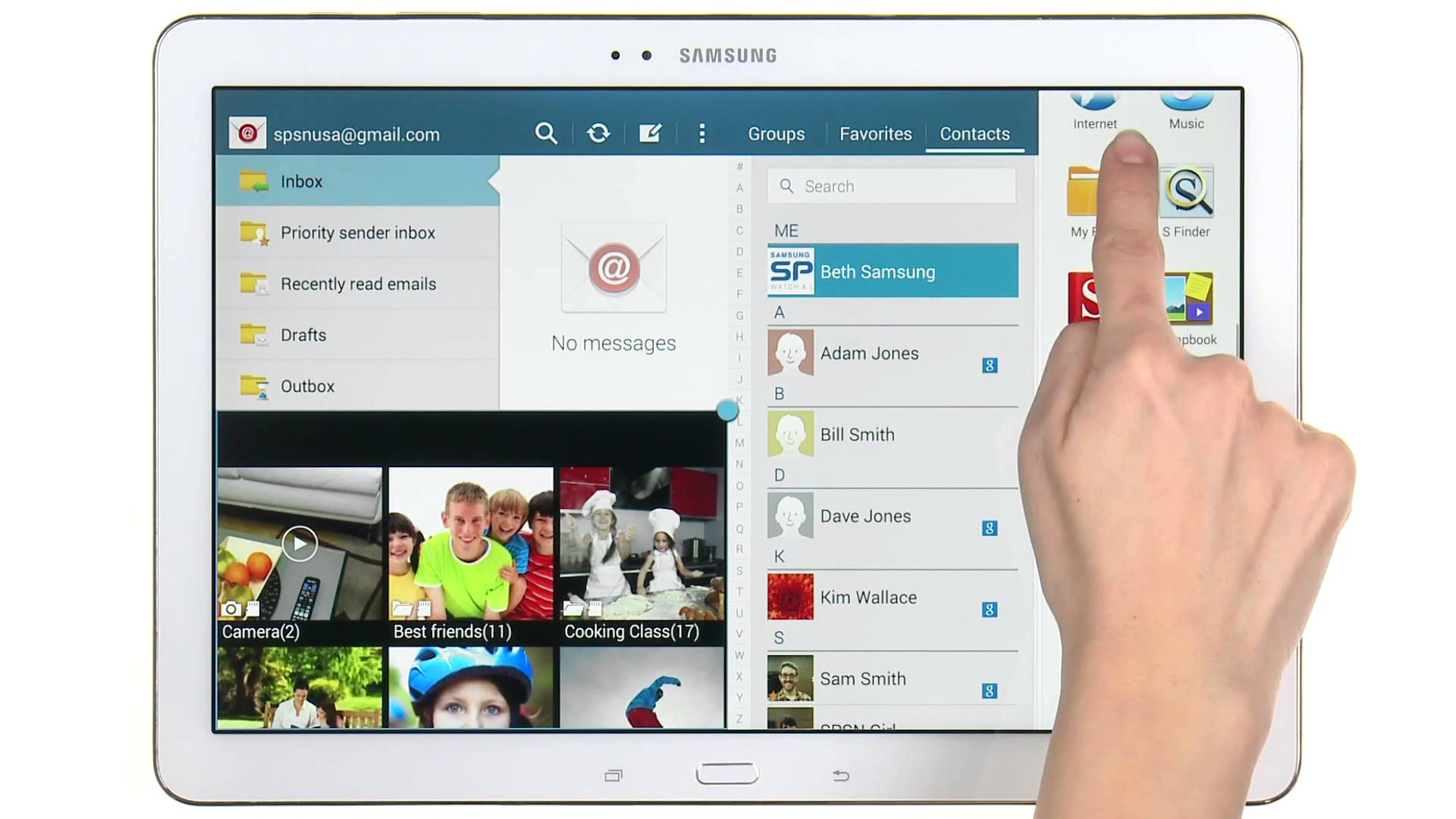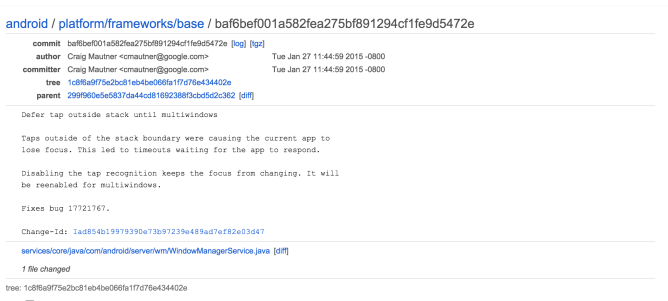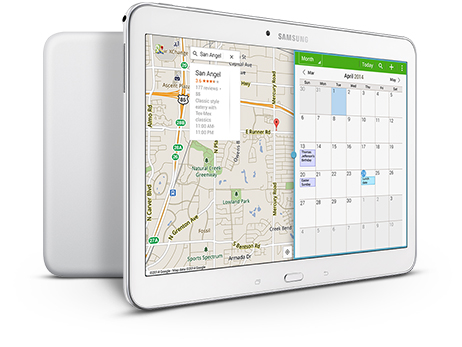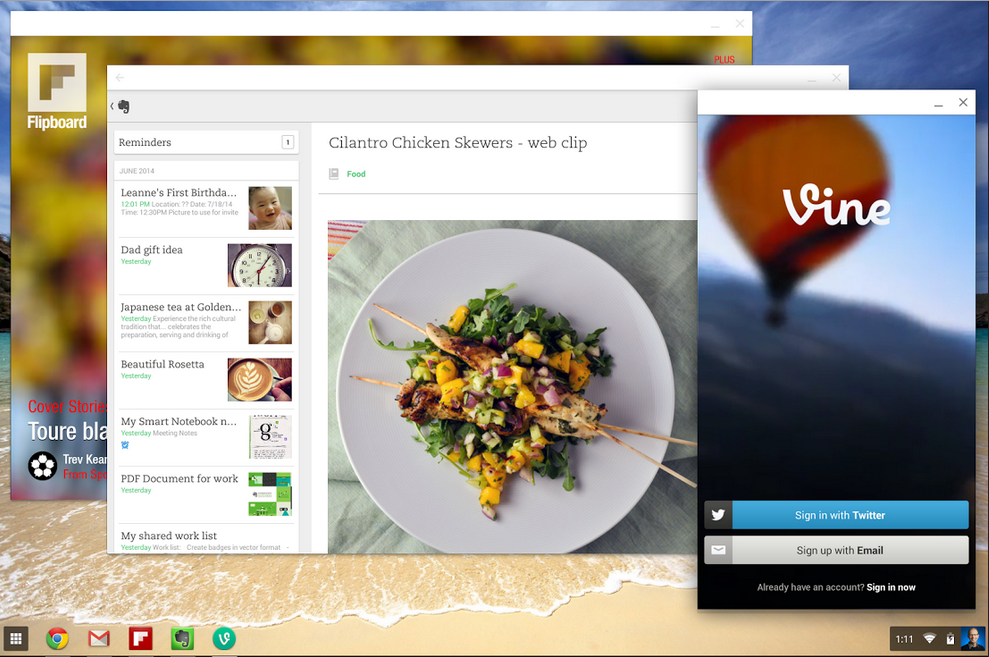New Multi-Windows Feature Could Increase Android's Appeal On PCs
A small hint in an Android source code commit revealed that Google may be working on a multi-windows feature for a future version of Android. The developer's statement doesn't say too much about it other than mention the word "multiwindows," but this just adds to another hint back from October last year that also pointed to multi-windows coming to stock Android.
Samsung has experimented with multi-windows on its tablets before, going from two to even four different apps running at the same time. The idea of showing multiple apps on a larger tablet screen would have made Android tablets more useful and more productive in the early stage of their life. It would have also solved the tablet app problem by using phone apps that would fit better on a smaller part of a large screen rather than being expanded to fit a 10" screen.
Samsung's multi-windows feature had two critical flaws, though. One was performance. Tablets seemed to slow down significantly when using multiple apps at the same time. However, it was never clear whether this was because of poor coding from Samsung, Android not being performance-optimized enough at the time, the processors not being fast enough to handle multi-windows, or a combination of all of these issues.
The second flaw with Samsung's multi-windows system was that it only worked with Samsung's apps, or apps that used Samsung's own SDK, in order to utilize the custom multi-windows APIs.
Google could be implementing this feature natively into Android at a time when Android has largely solved its performance issue thanks to the new runtime's Ahead-Of-Time compilation and other improvements over the years. Processors that are going into tablets are much faster as well, which should also help to run multiple apps at the same time.
Competitors such as Microsoft, Canonical, and likely Apple soon, too (with its rumored "iPad Pro" device), have used or will use multi-windows in their mobile operating systems as they become more mature and can work with more powerful hardware.
The question is how far Google is going to take this feature, and whether the company will make it so powerful that it could lead to Android becoming much more appealing as a PC operating system. Tablet sales have been stagnating or dropping lately, so perhaps Google will need to consider going into PCs with Android, as a more "advanced" operating system than Chrome OS.
Get Tom's Hardware's best news and in-depth reviews, straight to your inbox.
Google announced last year that Chrome OS will support Android apps, but it doesn't look like all Android apps can work by default, once Google modifies some code inside Chrome OS. Instead, so far we've only seen a handful of Android apps that have been pre-approved by Google for Chrome OS. If Google can't make all Android apps work inside Chrome OS, then perhaps Android could be more suited for the PC and as a competitor to Windows and Mac OS X, for those users who want to use an operating system that doesn't limit them to the Web.
Google will likely announce a new major version of Android at the next Google I/O event, along with the multi-windows feature.
Follow us @tomshardware, on Facebook and on Google+.
Lucian Armasu is a Contributing Writer for Tom's Hardware US. He covers software news and the issues surrounding privacy and security.
-
kenjitamura Sorry Google but I only use Android on mobile devices because I have to and I don't see any real advantage for using Android over a Ubuntu derivative on the Desktop.Reply -
drtweak They need to hire timduru from XDA Forums. He has had muti AND resizeable windows working on his custom 4.4.4 rom for a while. Works great. Only the tables they are designed for are slow 1Ghz dual cores with a Gig of RAMReply -
Achoo22 It's hard enough trying to keep Windows and Linux installations secure - no way I'm going to use Android on the desktop.Reply -
iam2thecrowe ReplyAren't we going in circles here?
yes, in fact, they should make circular windows to avoid being sued by windows. They could call this new OS Google Port-hole -
adgjlsfhk1 I already use android on my pc. It's this really cool open source fork of it developed specifically for PCs called Ubuntu.Reply -
synphul More like google 'corn-hole'. Big news, it's 2015 and a software platform is finally taking baby steps to *gasp* open not one but two, two windows at the same time? A feature that has only been in existence for the pc for over two decades (and even had an o/s named after this ability). Sorry for the sarcasm but seriously, where exactly is the news in this? What next, a company comes out with a new type of ink pen that doesn't involve dipping the quill into an ink well and the world goes mad?Reply -
chlamchowder synphul - I'm guessing it'll have windowing capability on par with Windows 1.0 (tiled windows) or maybe 2.0 (overlapping windows). The big question is how it'll hold up when Windows 95 comes out.Reply -
synphul I see where this could bring an improvement to mobile devices, tablets etc even though I thought there were already mobile devices out for awhile now boasting the power and capability to multitask with multiple apps at once. The part that made no sense was the reference to the 'interest' it would bring to pc users as somehow an alternative to *nix, windows, mac osx when it's so far behind. I don't see tablets having anything to offer pc's. They also mentioned something about running apps on pc's as if it's difficult and yet there are programs (and have been) that allow just that. Maybe certain apps that don't play nice on pc? I don't know, I do know I've ran several 'apps' from the chrome store just fine through chrome/windows on my pc.Reply
Lol @ 'when win95 comes out'
My take on it has always been that apps are essentially mini programs often lacking many features of the full blown programs available to pc users already. Why if as a pc user would I want to run a less powerful less featured version of something my hardware can already run? Apps were more or less 'light' versions of popular programs slimmed down to the point they could actually run on less powerful hardware like tablets and phones. Just doesn't make sense. Oh look, photoshop mobile and runs so good on a tegra processor with a tiny ram chip - really? Oh look, full featured photoshop runs even better on a real quad core with real ram and real storage on a real screen :P -
alidan show me 300 chrome tabs, 6 explorer windows, fubar, a taskmanager, resource monitor, skype, 14 txt files, 3 more explorer windows, acdsee 8 pro (not pro 8), a 1080p video file and steam open at the same time, along with a temp probe, hardware monitors, a screenshot program a macro program, a torrent program, a key rebinding program, and MAYBE you can get my attention with android.Reply
you get me to even consider it, emulate x86-64 on android to the point i can emulate windows and play games and than we will be talking.



